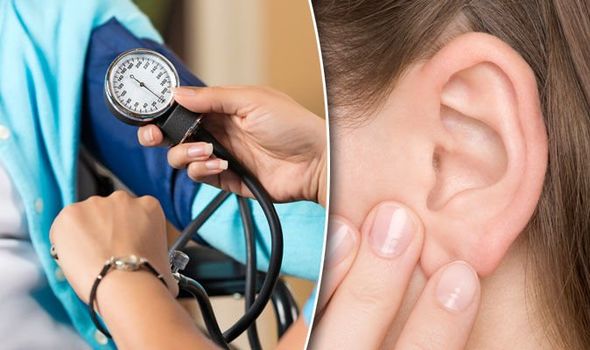Can Hypertension Affect Hearing And Ear Health?

Hypertension, commonly known as high blood pressure, is a prevalent health condition that affects a significant proportion of the global population. While its impact on cardiovascular health is well-documented, the relationship between hypertension and other bodily systems, such as the auditory system, remains an area of ongoing research.
This article aims to explore the potential effects of hypertension on hearing and ear health. By examining the existing literature, this article will investigate the link between hypertension and hearing loss, as well as other ear-related issues associated with this condition. Additionally, the importance of blood pressure management in preserving ear health will be discussed.
Furthermore, strategies for preventing hearing loss and maintaining overall ear health in individuals with hypertension will be explored. By understanding the potential impact of hypertension on hearing and ear health, individuals with this condition can take proactive steps to minimize the associated risks and maintain optimal auditory well-being.
Key Takeaways
- Hypertension can affect hearing and ear health.
- Regular hearing tests and check-ups are important to detect early signs of hearing loss and monitor auditory system condition.
- Following a healthy diet and exercise routine can contribute to both hypertension control and ear health.
- Medication and lifestyle changes are crucial for managing hypertension and reducing the risk of complications, including hearing loss.
Understanding Hypertension and its Effects on the Body
Hypertension, a condition characterized by high blood pressure, has been found to have significant effects on various systems of the body. Understanding hypertension causes and the impact of hypertension on cardiovascular health is crucial in comprehending its potential effects on hearing and ear health.
Hypertension can damage blood vessels throughout the body, including those in the inner ear. The inner ear contains delicate structures responsible for converting sound waves into electrical signals that the brain can interpret as sound. When blood vessels in the inner ear are damaged or narrowed due to hypertension, it can result in hearing loss or other auditory issues.
Additionally, hypertension can also increase the risk of developing conditions such as atherosclerosis and stroke, which can further impact hearing and ear health. Therefore, recognizing the relationship between hypertension and its potential effects on hearing and ear health is imperative in managing and preventing potential complications.
The Link Between Hypertension and Hearing Loss
This paragraph discusses the link between hypertension and hearing loss. It focuses on two key points: how high blood pressure damages the inner ear and the role of reduced blood flow in hearing loss.
High blood pressure can damage the delicate structures of the inner ear, leading to hearing loss.
Reduced blood flow caused by hypertension can also contribute to hearing loss by depriving the inner ear of the necessary oxygen and nutrients.
How High Blood Pressure Damages the Inner Ear
Damage to the inner ear caused by high blood pressure can have significant implications for hearing and ear health. High blood pressure’s impact on the inner ear can lead to damage in various ways.
One of the mechanisms is through the disruption of blood flow to the tiny blood vessels in the cochlea, which is responsible for transmitting sound signals to the brain. Reduced blood flow can result in the death of hair cells, which are essential for converting sound into electrical signals.
Additionally, high blood pressure can also cause damage to the delicate structures of the inner ear, such as the sensory cells and the auditory nerve. This damage can lead to sensorineural hearing loss, a type of hearing loss that is irreversible and affects the ability to hear soft sounds and understand speech clearly.
Therefore, it is crucial for individuals with hypertension to monitor their blood pressure levels regularly to prevent potential damage to the inner ear and preserve optimal hearing health.
The Role of Reduced Blood Flow in Hearing Loss
One possible sentence could be:
The impairment of blood flow in the cochlea can result in the death of hair cells, leading to irreversible sensorineural hearing loss.
Reduced blood flow to the inner ear is a significant factor contributing to hearing loss in individuals with hypertension.
The cochlea, which is responsible for converting sound waves into electrical signals, relies on a constant supply of oxygen and nutrients carried by the bloodstream. When blood flow is reduced, the delicate hair cells within the cochlea can become damaged or die off, resulting in a decline in hearing function.
This type of hearing loss, known as sensorineural hearing loss, is permanent and irreversible.
Therefore, it is crucial for individuals with hypertension to manage their blood pressure effectively to prevent or minimize the impact of reduced blood flow on their hearing health.
Other Ear-Related Issues Associated with Hypertension
High blood pressure has been linked to a range of other ear-related issues, which can evoke concern and raise awareness about the potential impact of hypertension on hearing and ear health. These issues include:
- Ear infections: Hypertension can weaken the immune system, making individuals more susceptible to infections in the ears. Ear infections can cause pain, hearing loss, and even damage to the structures of the ear if left untreated.
- Tinnitus management: Tinnitus, a condition characterized by ringing or buzzing sounds in the ears, can be worsened by hypertension. Managing tinnitus becomes more challenging when blood pressure is elevated, as it can exacerbate the symptoms and lead to increased distress for individuals affected by this condition.
Understanding the relationship between hypertension and these ear-related issues is crucial for healthcare professionals and individuals with high blood pressure. By addressing these concerns, appropriate preventive measures and treatment strategies can be implemented to protect and promote hearing and ear health in hypertensive individuals.
The Importance of Blood Pressure Management for Ear Health
Other Ear-Related Issues Associated with Hypertension have highlighted the potential impact of high blood pressure on various aspects of ear health. However, it is essential to emphasize the significance of blood pressure management for promoting ear health and preventing hearing loss. Maintaining optimal blood pressure levels plays a crucial role in reducing the risk of developing hearing problems associated with hypertension. Research suggests that effective blood pressure control can help preserve auditory function and prevent hearing loss. To illustrate the importance of blood pressure management for ear health, the following table provides a concise overview of the key interventions and strategies that can contribute to hearing loss prevention in individuals with hypertension.
| Blood Pressure Control Strategies | Hearing Loss Prevention Measures |
|---|---|
| Regular monitoring and assessment of blood pressure levels | Avoiding exposure to excessive noise levels |
| Following a healthy diet low in sodium and rich in potassium | Using ear protection in noisy environments |
| Engaging in regular physical activity | Avoiding smoking and excessive alcohol consumption |
| Complying with prescribed antihypertensive medications | Seeking prompt medical attention for ear-related symptoms |
By incorporating these strategies, individuals can enhance their overall ear health and mitigate the potential detrimental effects of hypertension on hearing.
Seeking Medical Help for Hypertension and Ear Health Concerns
Seeking timely medical assistance for the management of blood pressure and addressing any concerns related to the well-being of one’s ears can significantly contribute to overall wellness, providing peace of mind and ensuring long-term auditory health.
When it comes to hypertension and ear health, it is crucial to consult medical professionals who can accurately diagnose and treat the condition. They can recommend appropriate lifestyle changes, such as maintaining a healthy diet, engaging in regular exercise, and managing stress levels. These professionals can also prescribe medications to control blood pressure levels effectively.
Furthermore, seeking medical help allows individuals to monitor their blood pressure regularly and detect any potential complications early on. By taking proactive measures and enlisting the expertise of medical professionals, individuals can protect their hearing and maintain their ear health for years to come.
- Regular check-ups with medical professionals ensure timely intervention
- Medical experts provide personalized advice on lifestyle modifications
- Early detection of complications can prevent further damage to the ears
- Timely medical assistance provides peace of mind and reduces anxiety levels.
Preventive Measures to Protect Your Hearing and Ear Health
This paragraph will discuss two key preventive measures to protect hearing and ear health:
- Avoiding loud noises and protecting the ears: One important preventive measure is to avoid exposure to loud noises, as prolonged or intense noise can lead to hearing loss and other ear health concerns.
- Regular hearing tests and check-ups: Additionally, regular hearing tests and check-ups can help detect any early signs of hearing loss or other issues, allowing for timely intervention and management.
Avoiding Loud Noises and Protecting Your Ears
To safeguard your hearing and maintain ear health, it is crucial to take precautions and protect your ears from excessive noise exposure. Noise-induced hearing loss is a common condition that can be prevented by following certain measures. Here are some ways to avoid loud noises and protect your ears:
- Use protective gear such as earplugs or earmuffs in noisy environments or during activities that involve loud sounds like concerts or shooting ranges.
- Keep the volume of electronic devices, such as headphones or speakers, at a moderate level.
- Take breaks from noisy environments to give your ears time to rest and recover.
- Avoid prolonged exposure to loud noises by limiting your time in noisy places or using noise-cancelling headphones.
By implementing these measures, you can significantly reduce the risk of developing noise-induced hearing loss and ensure the long-term health of your ears.
Regular Hearing Tests and Check-ups
Regular hearing tests and check-ups are important in order to monitor and assess the condition of one’s auditory system and detect any potential issues or changes in hearing ability.
Regular hearing tests can help identify any early signs of hearing loss or damage caused by hypertension. These tests involve a series of evaluations that measure various aspects of hearing, including the ability to hear different frequencies and the clarity of speech.
Additionally, ear health check-ups can help identify any underlying conditions or infections that may be affecting the ears.
By regularly monitoring and assessing the auditory system, healthcare professionals can intervene early and provide appropriate interventions to prevent further hearing loss or manage any existing issues.
Overall, regular hearing tests and check-ups are essential in maintaining ear health and preventing any long-term complications associated with hypertension.
The Role of Diet and Exercise in Managing Hypertension and Ear Health
Diet and exercise play a crucial role in managing hypertension and promoting ear health. When it comes to hypertension, medication is often the first line of treatment. However, incorporating a healthy diet and regular exercise can greatly complement the effects of medication.
A diet rich in fruits, vegetables, whole grains, and low-fat dairy products can help lower blood pressure and reduce the risk of developing hypertension-related complications. Additionally, regular physical activity can improve blood circulation, reduce stress, and promote overall cardiovascular health.
Stress reduction techniques such as meditation, deep breathing exercises, and yoga can also be beneficial in managing both hypertension and ear health.
Overall, a balanced diet and regular exercise regimen can significantly contribute to the management of hypertension and the promotion of ear health.
Conclusion: Taking Control of Your Blood Pressure and Ear Health
In conclusion, by adopting a balanced lifestyle that includes a nutritious diet, regular physical activity, and stress reduction techniques, individuals can effectively manage their blood pressure and promote overall well-being.
Alongside lifestyle changes, medication may also be prescribed to control hypertension. It is important for individuals to work closely with their healthcare provider to find the right medication and dosage that suits their needs. Regular check-ups and monitoring of blood pressure levels are necessary to ensure that the medication is effective. However, medication alone is not sufficient in managing hypertension.
Lifestyle modifications play a crucial role in maintaining healthy blood pressure levels and promoting ear health. By managing hypertension effectively, individuals can reduce the risk of complications, including potential hearing loss or other ear-related issues.
Therefore, a combination of medication and lifestyle changes is essential for optimal blood pressure control and ear health.
Frequently Asked Questions
What are the common symptoms of hypertension?
Common symptoms of hypertension include headaches, dizziness, nosebleeds, chest pain, and shortness of breath. Treatment options for hypertension may include lifestyle changes, such as regular exercise and a healthy diet, as well as medication to lower blood pressure.
Is there a cure for hypertension?
There is no cure for hypertension, but it can be managed through lifestyle modifications and medication. Treatment aims to control blood pressure and reduce the risk of complications associated with hypertension.
Can hypertension lead to permanent hearing loss?
Hypertension, if not properly managed, can increase the risk of permanent hearing loss. It is important to control blood pressure levels through appropriate medication and lifestyle modifications to minimize potential damage to the auditory system.
Are there any natural remedies to lower blood pressure and improve ear health?
Natural remedies and alternative therapies have been explored for their potential to lower blood pressure and improve ear health. These approaches may include dietary changes, regular exercise, stress reduction techniques, and the use of specific herbs or supplements.
Can stress contribute to both hypertension and hearing problems?
Stress management techniques play a crucial role in maintaining cardiovascular health. There is a known relationship between stress and hypertension, as well as between stress and hearing problems, although the exact mechanisms are still being studied.








